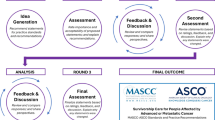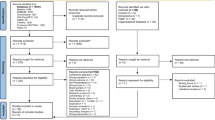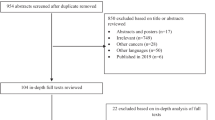Abstract
Purpose
Breast cancer survivorship care is provided by surgical and medical oncologists, primary care physicians (PCPs), and nurse practitioner survivorship specialists (NPs). The study objective was to identify whether frequency of cancer screening and discussion of healthy lifestyles differed across these provider types. We also determined differences by provider in survivor reported follow through with lifestyle recommendations.
Methods
Breast cancer survivors completed surveys regarding the type of health-care provider they most recently saw, cancer screening, discussion, and self-reported lifestyle change since their breast cancer diagnosis.
Results
Seven hundred fifty-nine breast cancer survivors (78.7 % of those invited) completed the survey; 51.8 % indicated that their last visit was with a medical oncologist. There was no difference in rates of cancer screening (colon, cervical, and breast) among types of providers. A significantly larger proportion of patients who last saw an NP reported that they had discussed physical activity (78.6 %) as compared to medical oncologist 54.4 %, surgeon 43.1 %, radiation oncologist 64.1 %, and PCP 61.3 % (p < 0.001). Similar observations were observed for discussion of nutrition and weight (NP 70.0 %, medical oncologist 36.5 %, surgeon 25.7 %, radiation oncologist 48.7 %, PCP 35.5 %; p < 0.001). There was no significant difference across provider type in self-reported implementation of change in physical activity or diet.
Conclusions
Our data indicate that a visit to the NP was related to comparable screening rates, but despite that NPs are more often discussing lifestyle modification, self-reported change in nutrition and physical exercise did not differ across provider type.
Implications for Cancer Survivors
NPs perform favorably with respect to lifestyle recommendations. Given the reported lack of lifestyle change, it is important to triage to providers who specialize in lifestyle modification and, if plausible, learn and provide actual evidence-based approaches to achieve positive outcomes in this area.
Similar content being viewed by others
References
American Cancer Society. Cancer facts & figures 2012. Atlanta: American Cancer Society; 2012.
American Cancer Society. Cancer facts & figures 2010. Atlanta: American Cancer Society; 2010.
Erikson C, Salsberg E, Forte G, et al. Future supply and demand for oncologists. J Oncol Pract. 2007;3:79–86.
Institute of Medicine and the National Research Council. From cancer patient to cancer survivor: lost in transition. Washington, DC: The National Academies; 2005.
Mosher CE, Sloane R, Morey MC, et al. Associations between lifestyle factors and quality of life among older, long-term breast, prostate, and colorectal cancer survivors. Cancer. 2009;115(17):4001–9.
Chlebowski RT, Blackburn GL, Thomson CA, et al. Dietary Fat reduction and breast cancer outcome: interim efficacy results from the Women’s Intervention Nutrition Study. JNCI J Natl Cancer Inst. 2006;98(24):1767–76.
Trentham-Dietz A, Newcomb PA, Nichols HB, et al. Breast cancer risk factors and second primary malignancies among women with breast cancer. Breast Cancer Res Treat. 2007;105:195–207.
Ellsworth RE, Valente AL, Shriver CD, et al. Impact of lifestyle factors on prognosis among breast cancer survivors in the USA. Expert Rev Pharmacoecon Outcome Res. 2012;12(4):451–64.
Holick CN, Newcomb PA, Trentham-Dietz A, et al. Physical activity and survival after diagnosis of invasive breast cancer. Cancer Epidemiol Biomarkers Prev. 2008;17:379–86.
Patterson RE, Neuhouser ML, Hedderson MM, et al. Changes in diet, physical activity, and supplement use among adults diagnosed with cancer. J Am Diet Assoc. 2003;103:323–8.
Zhao G, Li C, Okoro CA, et al. Trends in modifiable lifestyle-related risk factors following diagnosis in breast cancer survivors. J Cancer Surviv 2013.
Damush TM, Perkins A, Miller K. The implementation of an oncologist referred, exercise self-management program for older breast cancer survivors. Psycho-Oncology. 2006;15:884–90.
Jones LW, Courneya KS, Fairey AS, et al. Effects of an oncologist’s recommendation to exercise on self-reported exercise behavior in newly diagnosed breast cancer survivors: a single-blind, randomized controlled trial. Ann Behav Med. 2004;28(2):105–13.
McCabe MS, Bhatia S, Oeffinger KC, et al. American Society of Clinical Oncology statement: achieving high-quality cancer survivorship care. J Clin Oncol. 2013;31(5):631–40.
Mayer EL, Gropper AB, Neville BA, et al. Breast cancer survivors’ perceptions of survivorship care options. J Clin Oncol. 2012;30(2):158–63.
Oeffinger KC, McCabe MS. Models for delivering survivorship care. J Clin Oncol. 2006;24(32):5117–24.
Trotter K, Frazier A, Hendricks CK, et al. Innovation in survivor care: group visits. Clin J Oncol Nurs. 2011;15(2):E24–33.
Thompson CL, Li L. Association of sleep duration and breast cancer OncotypeDX recurrence score. Breast Cancer Res Treat. 2012;134(3):1291–5.
Leidner RS, Li L, Thompson CL. Dampening enthusiasm for circulating microRNA in breast cancer. PLoS One. 2013;8(3):e57841.
Mastellos N, Gunn LH, Felix LM, et al. Transtheoretical model stages of change for dietary and physical exercise modification in weight loss management for overweight and obese adults. Cochrane Database Syst Rev. 2014;5:2.
Cahill K, Lancaster T, Green N. Stage-based interventions for smoking cessation. Cochrane Database Syst Rev. 2010;10:11.
Green HJ, Steinnagel G, Morris C, et al. Health behaviour models and patient preferences regarding nutrition and physical activity after breast or prostate cancer diagnosis. Eur J Cancer Care. 2014;23(5):640–52.
Hollowell K, Olmsted CL, Richardson AS, et al. American society of clinical oncology-recommended surveillance and physician specialty among long-term breast cancer survivors. Cancer. 2010;1:2090–8.
Kantsiper M, McDonald EL, Geller G, et al. Transitioning to breast cancer survivorship: perspectives of patients, cancer specialists, and primary care providers. J Gen Intern Med 24(Suppl 2):459–466.
Virgo KS, Lerro CC, Klabunde CN, et al. Barriers to breast and colorectal cancer survivorship care: perceptions of primary care physicians and medical oncologists in the United States. J Clin Oncol. 2013;31(18):2322–36.
Earle CC, Ganz PA. Cancer survivorship care: don’t let the perfect be the enemy of the good. J Clin Oncol. 2012;30(30):3764–8.
Salz T, Oeffinger KC, McCabe MS, et al. Survivorship care plans in research and practice. CA Cancer J Clin. 2012;62:101–17.
Stricker CT, Jacobs LA, Risendal B, et al. Survivorship care planning after the Institute Of Medicine recommendations: how are we faring? J Cancer Surviv. 2011;5:358–70.
Rechis R, Beckjord EB, Arvey SR, et al. The essential elements of survivorship care: a livestrong brief. December 2011. http://www.livestrong.org/pdfs/3-0/EssentialElementsBrief.
Demark-Wahnefried W, Jones LW. Promoting a healthy lifestyle among cancer survivors. Hematol Oncol Clin N Am. 2008;22(2):319–42.
Webb TL, Joseph J, Yardley L, et al. Using the internet to promote health behavior change: a systematic review and meta-analysis of the impact of theoretical basis, use of behavior change techniques, and mode of delivery on efficacy. J Med Internet Res. 2010;12(1):e4.
Eyigor S, Kanyilmaz S. Exercise in patients coping with breast cancer: an overview. World J Clin Oncol. 2014;5(3):406–11.
Bourke L, Homer KE, Thaha MA, et al. Interventions for promoting habitual exercise in people living with and beyond cancer. Cochrane Database Syst Rev. 2013;24:9.
Bourke L, Homer KE, Thaha MA, et al. Interventions to improve exercise behaviour in sedentary people living with and beyond cancer: a systematic review. Br J Cancer. 2014;110(4):831–41.
Conflict of interest
The authors declare that they have no conflict of interest.
Author information
Authors and Affiliations
Corresponding author
Rights and permissions
About this article
Cite this article
Kenison, T.C., Silverman, P., Sustin, M. et al. Differences between nurse practitioner and physician care providers on rates of secondary cancer screening and discussion of lifestyle changes among breast cancer survivors. J Cancer Surviv 9, 223–229 (2015). https://doi.org/10.1007/s11764-014-0405-z
Received:
Accepted:
Published:
Issue Date:
DOI: https://doi.org/10.1007/s11764-014-0405-z




